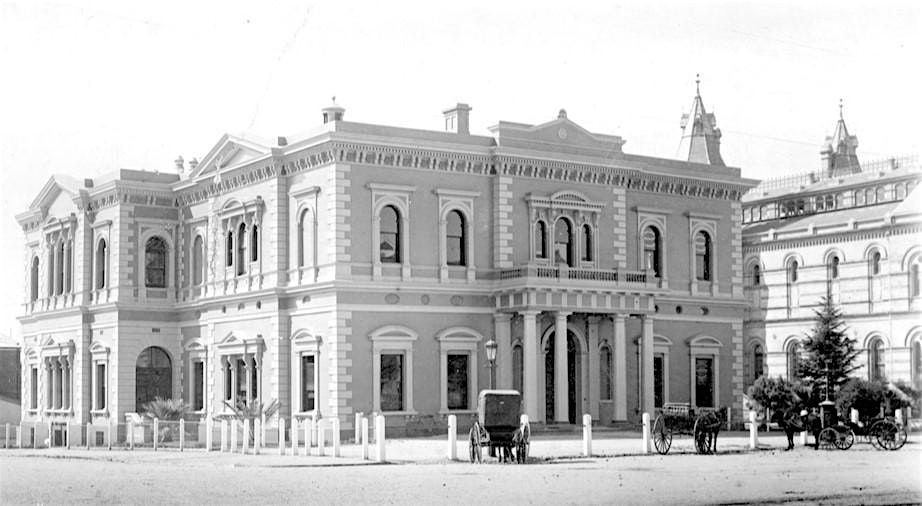
About this Event
Come and join us for a free lecture night on Tuesday, 23 April from 5:30pm at the Hetzel Lecture Theatre, North Tce, delivered by our 2023 Fellow Maggi Boult, 2024 Fellow Dr Alice Neikirk, and recipient of the 2024 Highly Recommended Prize Dr Angela Gurr. The three presentations will explore their research projects, which focus on key aspects of South Australian history and heritage.
Margaret (Maggi) Boult (2023 Fellow)
Margaret Boult is an independent medical historian and visiting researcher at the University of Adelaide’s Discipline of Surgery. Her research interests include nineteenth and twentieth century medical practices, institutions, practitioners and diseases. She was awarded a Master of Philosophy in 2019 for her thesis Epilepsy in the Lunatic Asylums of South Australia (1853-1913). Although her first degree was in Botany, most of her published papers are on medical topics.
Title: Settler Health in Early South Australia, 1836 – 1856
When he reviewed the history of health and disease in Australia, John H.L. Cumpston (the first Director-General at the Australian Department of Health) observed that for South Australia ‘there is not much authentic information concerning the occurrence of disease for the first twenty years of its history.’ In 2023, through the support of the HCSA, I attempted to rectify this by searching through letters and diaries of early settlers, kept by the SLSA, in order to locate information about health and medical matters during the years 1836 to 1856. I identified nearly sixty sources and extracted around 65,000 words that pertained directly, or indirectly, to settler health.
These sources must be interpreted with caution. Letters written home would undergo a degree of self-censorship, either to prevent distant families worrying, or to encourage others to join them in South Australia. Diaries were curated as writers represented their lives according to the moral and social mores of the day and consciously (or unconsciously) wrote for a future readership. Further, those who wrote letters and diaries tended to be ‘of the middling sort’; people who could afford medicine and the services of doctors, and whose relative wealth meant they were not representative of the poorest and least educated.
There will undoubtedly be more information hidden in the State Library archives, but amongst the sources located there is sufficient to identify recurring themes and gain an understanding of early medical concerns. The most frequently mentioned diseases were ophthalmia and dysentery – the former a significant nuisance and the latter a potential killer, particularly of children. Noteworthy accidents regularly appeared in the records, whilst tuberculosis and scurvy, though less conspicuous, also had a significant effect. In this talk I will focus on three settler stories, using them to paint a picture of the health concerns and medical treatments used during this period of early settlement.
Dr Alice Neikirk (2024 Fellow)
Dr Alice Neikirk has a PhD from the Australian National University. She is currently the Program Convenor for Criminology in the School of Law and Justice at the University of Newcastle. She has published extensively on the role of criminal and international tribunals in creating a historical record, as well as the relationship between competing historical narratives, minority groups, and ethnic cleansing. A passionate believer in making knowledge accessible, she is leading a program that translates complex legal concepts into accessible infographics for new migrants in Australia so they are aware of their rights and responsibilities. This is an approach she also brings to her historic research, publishing not only in academic outlets but also The Conversation, and speaking at museums.
Title: Police Matrons (and Their Advocates) in South Australia
This year marks the 125 anniversary of the first official recognition of a police matron in Australia, but most of us have never heard of these women. It is also not obvious from the designation of ‘first police matron’ that women worked in this role for at least fifty years before receiving official recognition. This is unfortunate because these women opened the door for females to move into the police force, yet their role is still either completely unrecognized or dismissed as an extension of her husband's policing duties. The State Records of South Australia have what appears to be the largest collection of police matron’s diaries in Australia. This is an invaluable resource to help us understand what these women did, how they contributed to the integration of women into policing, and their role in Australian history. Further, the State Library of South Australia houses several microfilmed resources regarding the advocacy work that supported the appointment of police matrons. Bringing these two resources together will help underscore the role of female-led organizations, like the Woman’s Temperance League, in social reform. This study will contribute to a deeper understanding of women’s experiences in Victorian era Australia.
Dr Angela Gurr (2024 Recipient of the Highly Recommended Prize)
Dr Angela Gurr has a Bachelor of Archaeology from Flinders University and an upper first-class Honours from the University of Adelaide. Her PhD, also from the University of Adelaide, ‘A view of colonial life in South Australia: An osteological investigation of the health status among 19th-century migrant settlers’, received the Dean’s commendation for Doctoral Excellence in 2023. Angela’s interest in historical archaeology and the health and life histories of migrant settlers to South Australia has seen her research the skeletal remains of a sample of 19th-century European individuals from St Mary’s Anglican Church Cemetery, SA, since 2018. As a postdoctoral scholar and member of staff with the Craniofacial Biology Research Group at the Adelaide Dental School, University of Adelaide, she applies advances in bioarcheological techniques to examine the skeletons that allow a more in-depth understanding of their health challenges. Dr Gurr values the use of interdisciplinary methods and collaborations to provide a broader methodological application which can yield fresh insight into the life histories previously unknown individuals and enriching our understanding of the early decades of the South Australian colony.
Title: Combining historical records and archaeological methods to enhance identification of individuals in unmarked graves and increase understanding of their lifestyle challenges
The aim of this study is to explore how combining information from historical documentation with advances in bioarchaeological analysis of human skeletons can enhance understanding of life histories and the identification of the skeletal remains of individuals from the past. A review of the accessibility of documentation will consider whether diverse information should be grouped into corpora and digitized to advance research opportunities through improved availability.
The project involves an extensive investigation of multiple sources of historical documentation including burial records, ships logs, applications for free passage to South Australia, official government registers such as death certificates, coroner’s inquests, state and local government land ownership records, 19th century newspapers, and historical rare books. These sources will be used to build life histories for unknown individuals excavated from graves in an unmarked section St Mary’s Anglican Church Cemetery, South Australia. Historical records will be investigated in conjunction with a bioarchaeological analysis of the excavated skeletons. The oral and skeletal health of the individuals will be assessed using macroscopic, radiographic and Micro-CT scanning techniques. The findings from both investigations will provide information relating to their occupation, lifestyle, health, habits, and their causes of death. Chemical analysis of teeth will enhance understanding of their ancestry, early life residency and diet. Contextual background for the lives of the individuals and those of their family before, during, and after migration to this new 19th-century colony will be explored.
For information about the HCSA Fellowship, visit our website.
Event Venue & Nearby Stays
Hetzel Lecture Theatre, North Terrace, Adelaide, Australia
AUD 0.00
